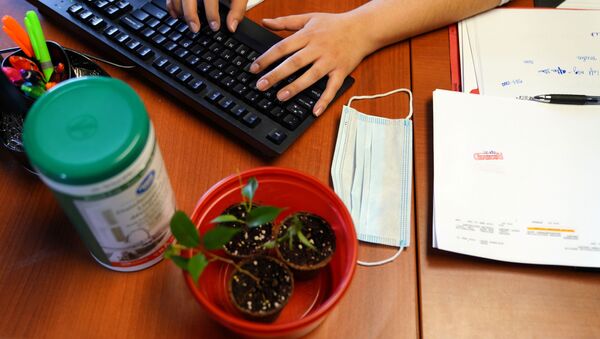Dr Asanka Gunasekara, a lecturer at Swinburne Business School Australia, has provided her insight into how workers can adjust to the new challenges brought on by COVID-19 in four steps.
Sputnik: How can workers adjust to the new challenges of working from home brought on by COVID-19?
Asanka Gunasekara: I have a little acronym for you today. The acronym that I would like to use is a 'R.A.I.N'. R is to recognise, A is to accept, I is to investigate and N is to negotiate. So what I mean by recognise is we've got to understand and recognise this time is different. We have never been in this kind of situation. You've got to understand that it's different - you've got to recognise it. The next thing would be is to accept it. It is different, it's beyond our control. It's good that we accept the present reality as it is, so we can try to see how we change. The next area is investigate. Again, it's a good time to investigate how we can change the way we do things and who really matters in our lives and what really matter in our lives in this situation. So that will kind of help us just prioritise everything that we have to do.
Sputnik: What attitude should be adopted by employers and employees amid lockdown and greater remote working?
Asanka Gunasekara: The number one attitude that we need to have in this kind of situation is a positive attitude towards change. If we don't have that positive attitude towards change it could just screw things up as an individual as an employee. The next important thing is we have to be open minded. As employers and as employees we've got to be open minded. Employers or employees may suggest new ways of doing things and they may have new demands. We've got to be open minded to think about why and how they're asking these things. So we have to have the attitude of "you can be innovative, you can come up with new suggestions and new ideas if that's working well in your context". Management leaders need to encourage people to try out new things and it's okay to fail.
Sputnik: How can employees working from home safe guard their mental health for the foreseeable future around remote working?
Asanka Gunasekara: I guess the number one thing as I said to you before is you've got to accept the different reality. It's different but we are all in this situation together and we all need to come out together. So, accept the situation as it is because if you try to deny the situation, if you try to reject the kind this kind of attitude, you're not going to help yourself. The attitude of accepting the present reality is the number one thing. The next one is as I said to you before again open and honest communication with people who really matter to you. They say helping habits or giving habits generally that these kinds of habits are really helpful for people to be mentally healthy. People feel really good about themselves by offering something, by being generous, perhaps their time of knowledge. There can be people who are more knowledgeable than you in this context so try to access the people and help that really help your own mental health as well.




